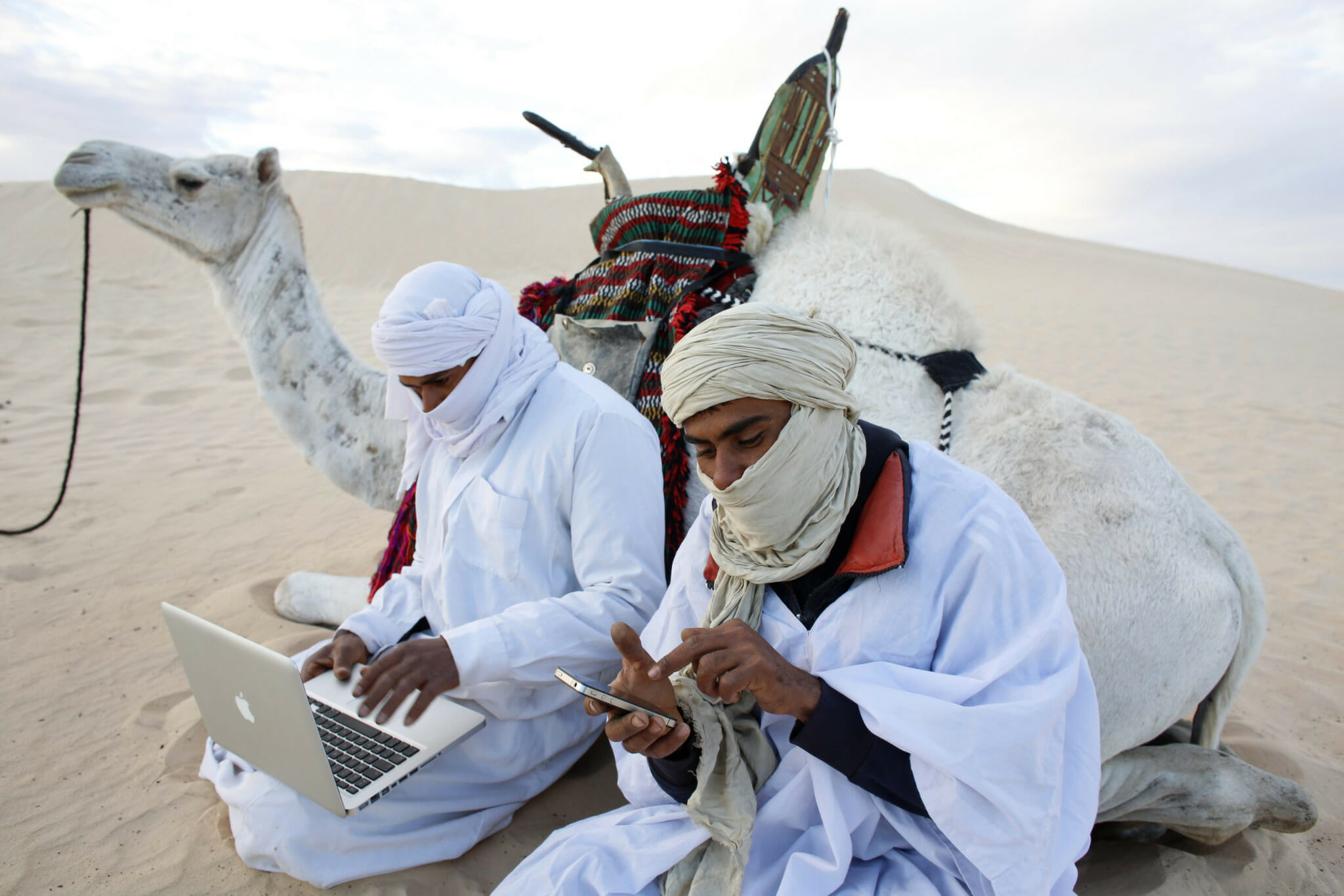Humans have always been nomads – the early men moved everywhere, tracking stars, migrating in an effort to hunt, and protect our tribes and families from vicious predators. The rise of civilization didn’t stop this as humans migrated for different reasons. However, the birth of technology also birthed how people can work from anywhere around the world while in transit. This is digital nomadism as explained in our earlier post. A digital nomad is someone who leverages modern-day technologies to work remotely from anywhere in the world.
Digital nomadism is the new normal. The rise of technology with an increasing number of communication channels like Skype, Slack and lately Zoom, coupled with flexible payment options like paystack, Paypal etc., has made the digital nomad movement gain steam.
After the torrid experience of 2020 caused by the pandemic, 2021 has brought a lot of hope along with it. Countries have relaxed their travel restrictions and the hope of being able to travel safely are there again. With remote work becoming the norm for many around the world and the ability to travel again looming on the horizon, digital nomads can kick back their careers, while interested people can start their own nomadic experiences.
Categorizing Digital Nomads
Digital nomads typically fall into two groups:
- Freelancers and entrepreneurs
- Remote workers and telecommuters.
The main difference is that freelancers and entrepreneurs run their own businesses while remote workers and telecommuters are employees for a company.

Digital nomads are all around us
According to research by MBO Partners, in 2018, 4.8 million independent workers described themselves as digital nomads, and many more —17 million aspire to someday become nomadic. According to a 2020 study by MBO Partners, there are 10.9 million digital nomads in the U.S. alone, excluding the millions in almost every country in the world. Another research suggests there are 4.8 million global digital nomads, and that 17 million workers dream of going nomadic in the future.
Digital nomads tend to be younger people and can be found working in most industries in the knowledge economy: marketing, design, IT, writing, media, tutoring, and consulting.
Steps to become a Digital Nomad
Start your Journey
Becoming a digital nomad is easier now than it was a decade ago. Decide if it is really what you want and once you have decided, focus your energy on finding a job that allows you to work remotely. Make every necessary information you need to start.
Identify & Develop needed Skills
Start by taking a good look at your existing skill set. Find out what you’re good at and what’s in demand. Identify skills that are not only interesting to you but also in high demand. Take a lot at jobs and other freelancer’s profiles on freelance or remote job sites as a for your research. Make note of what potential clients are looking for and assess how your skills can fill the gap.
Use of online learning platforms like edX and Coursera where you’ll get a certificate for completing courses – this boosts your profile and adds trustworthiness to you. You can also learn from other users sharing their expertise for free on YouTube. Be on the lookout for communities or forums related to the skills you’re learning. This way, you have a place to ask questions and learn from others.
It’s time to find clients
Once you’ve decided what your service offering is going to be, it’s time to find clients for your business. Start by setting up your profile on Remote job sites. A professional, well thought out profile is key to finding clients on these sites.
Once your profile is ready, start sending out proposals for projects. Find a project you feel confident about delivering great work for and submit a proposal. When writing your proposal, think about what makes you particularly attractive to the client. Every client wants to know why they should choose you instead of a different freelancer. Focus your proposal on effectively answering this question.
Keep your proposal short, friendly and professional. Read the project description and address it in your proposal. Provide work samples as this is the best proof of your suitability for a project.
Build your business
Getting one project is a great start, but to succeed as a digital nomad, you must build a sustainable business—one that generates work consistently.
The goal is to build a reliable income by having clients look for you. In order to do this, it’s important to deliver quality work and build successful relationships with clients. Create a great impression every single time. Don’t think of clients as a one-and-done deal. Work on building ongoing relationships. This leads to ongoing work—and also referrals. You may also want to consider setting up your own business website to increase your online presence. Your website is a great way to start building your personal brand as an independent professional. Additionally, you may also like to start blogging. Blogging is the perfect avenue to show off your expertise in a particular area.
Plan your first Travel & pack your bags
If your test run goes well, you’re ready to plan your first digital nomad stint away from home. This can be as short or as long as you like. If you’re planning international travel, be mindful of travel restrictions in different countries. If you’re not ready to travel internationally yet, choose a destination in your own country. You make the rules.Have necessary travel documents. Research your destination(s) to make sure you’re eligible to work there legally. Ensure you have legal documents in the country you want to travel to.
Join a Digital Nomad community

This is a way of getting eased into the digital nomadism career. The digital nomad community has built-in support groups and a wealth of knowledge to navigate the nomad lifestyle. You can learn new skills from community members, ask questions, and get insights into selecting your new base. Try joining location-specific Facebook groups or platforms like Linkedin etc. to learn more about them.
Planning Your Budget
Some costs to consider when travelling or choosing a country to go include:
– Accommodation
– Health Insurance
– Local SIM card and data packages
– Groceries and eating out
– Leisure expenses
– Tourist visas
– Transportation
– Coworking space membership
– Travel tickets such as planes, trains, and buses
Setting a budget helps to visualize your expected expenses and understand when it’s okay to spend extra on things like travel and entertainment.
Global Adoption of Digital Nomads as immigrants- Best countries to visit
It is usually advisable to travel to countries who have laws that favours digital nomads. Amongst the countries that have regulated the legal framework for digital nomads are Germany, Estonia, the Czech Republic, Portugal, Croatia, Norway, and other non-EU member states such as Costa Rica, Georgia, Dubai, the Cayman Islands, Bermuda, Barbados, Antigua, Mexico, Australia, and Thailand.

Romania is seen as one of the best countries for remote working, mainly because of its high internet speed or the low monthly rent of a one-bedroom apartment. The 10 most visited places by digital nomads are:
- Chiang Mai, Thailand
- Bangkok, Thailand
- Ubud, Bali
- Berlin, Germany
- Ho Chi Minh City, Vietnam
- Las Palmas, Spain
- Pai, Thailand
- Budapest, Hungary
- Hanoi, Vietnam
- Medellin, Colombia
How Much Money Can You Make as a Digital Nomad?
Due to the nature of work, a digital nomad isn’t a salary earner; so what you earn as a digital nomad depends on the type of work you do.
According to a 2018 survey (the most recent figures as of April 2021) from FlexJobs ( a remote job company), 18% of digital nomads report making six figures or more, and 22% make between $50,000 and $99,999. These figures show that 40% of digital nomads make $50,000 or more, but 60% make less than $50,000 a year.
What Are the Best Websites for Digital Nomads Looking for Work?
Since digital nomads have wide recognition around the world, many international jobs await them as long as they have the value to give. There are dozens of websites for finding remote work. We Work Remotely, Up Work, Flex Jobs, LinkedIn, and Stack Overflow are great for web developers and IT professionals.
The decision to become a Digital Nomad is yours
As more jobs can be done remotely, living a digital nomadic lifestyle will surely continue to grow. The choice to make your own hours, have variety in your work environments and give up on commuting while travelling the world are just a few reasons for becoming a digital nomad. However, being a successful digital nomad takes hard work, planning, plus budgeting and networking skills.









Discussion about this post